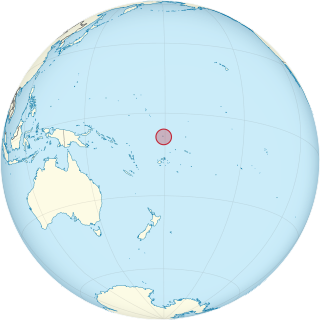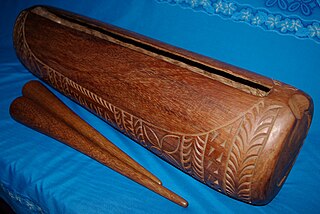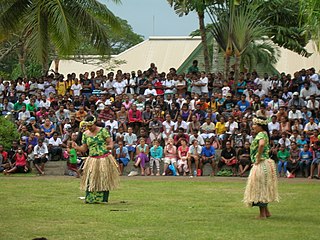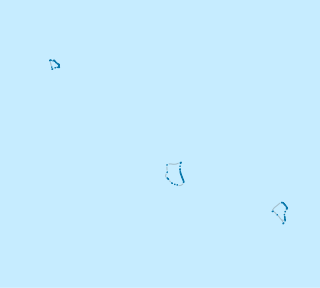
Tokelau is a dependent territory of New Zealand in the southern Pacific Ocean. It consists of three tropical coral atolls: Atafu, Nukunonu, and Fakaofo. They have a combined land area of 10 km2 (4 sq mi). In addition to these three, Swains Island, which forms part of the same archipelago, is the subject of an ongoing territorial dispute; it is currently administered by the United States as part of American Samoa. Tokelau lies north of the Samoan Islands, east of Tuvalu, south of the Phoenix Islands, southwest of the more distant Line Islands, and northwest of the Cook Islands.

Tuvaluan, often called Tuvalu, is a Polynesian language closely related to the Ellicean group spoken in Tuvalu. It is more or less distantly related to all other Polynesian languages, such as Hawaiian, Māori, Tahitian, Samoan, Tokelauan and Tongan, and most closely related to the languages spoken on the Polynesian Outliers in Micronesia and Northern and Central Melanesia. Tuvaluan has borrowed considerably from Samoan, the language of Christian missionaries in the late 19th and early 20th centuries.

The music of Tokelau occurs in the atolls of Atafu, Nukunonu, and Fakaofo. It is dominated by communal choral activity in harmony, with percussive accompaniment including log drums (pate), pokihi and apa. Nukunonu is notable for traditional song and dance.
Tokelauan is a Polynesian language spoken in Tokelau and historically by the small population of Swains Island in American Samoa. It is closely related to Tuvaluan and is related to Samoan and other Polynesian languages. Tokelauan has a co-official status with English in Tokelau. There are approximately 4,260 speakers of Tokelauan, of whom 2,100 live in New Zealand, 1,400 in Tokelau, and 17 in Swains Island. "Tokelau" means "north-northeast".

Atafu, formerly known as the Duke of York Group, is a group of 52 coral islets within Tokelau in the south Pacific Ocean, 500 kilometres north of Samoa. With a land area of 2.5 square kilometres, it is the smallest of the three islands that constitute Tokelau. It is an atoll and surrounds a central lagoon, which covers some 15 km2 (5.8 sq mi). The atoll lies 800 kilometres south of the equator at 8° 35' South, 172° 30' West. Atafu is the northernmost area under New Zealand sovereignty.

The politics of Tokelau takes place within a framework of a parliamentary representative democratic dependency. The head of state of Tokelau is King Charles III in right of his Realm of New Zealand, who is represented by an Administrator. The monarch is hereditary, the Administrator is appointed by the New Zealand Minister of Foreign Affairs and Trade.

The Ulu-o-Tokelau is the head of government of Tokelau, often simply called the Ulu. The position rotates yearly between the faipule (leaders) of Tokelau's three atolls: Atafu, Fakaofo, and Nukunonu. The current Ulu is Alapati Tavite, the Faipule of Nukunonu atoll, who has held the position since 12 March 2024.

Kuresa Nasau is a Tokelauan politician who has served as head of government five times and as faipule of Atafu.

Severe Tropical Cyclone Percy was an extremely powerful tropical cyclone, which was the third and last Category 5 cyclone to form in the 2004–05 South Pacific cyclone season. The seventh named storm and the fourth and final severe tropical cyclone to form during the 2004–05 South Pacific cyclone season. Percy originated as a tropical disturbance on February 23. Over next few days, the system organized while moving east southeastward, before intensifying into a Category 1 tropical cyclone on the Australian region scale on February 26. The system quickly intensified, reaching Category 4 status later that day. On the next day, Percy was steered southward by a blocking ridge of high pressure, while stretched out the structure of the storm into an elliptical shape, weakening it back to Category 3 status. Afterward, the storm rapidly reintensified, reaching its peak intensity as a Category 5 tropical cyclone on March 2. Afterward, Percy encountered increasing wind shear and weakened once again, turning southeastward on the next day. On March 5, Percy transitioned into an extratropical storm, before dissipating soon afterward.

The Roman Catholic Mission Sui Iuris of Tokelau in Tokelau is a suffragan mission of the Roman Catholic Archdiocese of Samoa-Apia. It was formed in 1992 when the Archdiocese of Samoa-Apia and Tokelau was split into the Archdiocese of Samoa-Apia and the Mission Sui Iuris of Tokelau. The position of Ecclesiastical Superior is currently vacant following the death of Archbishop Alapati Lui Mata’eliga on 25 April 2023.

A referendum on self-determination was held in Tokelau on 20 October and on 22–24 October 2007, with the result being that self-governance was rejected. Had it been successful, the referendum would have changed Tokelau's status from an unincorporated New Zealand territory to a self-governing state in free association with New Zealand, akin to the Cook Islands and Niue. However, the referendum required a two-thirds positive vote to pass, and the "yes" side fell short of the required total by 16 votes.

The following outline is provided as an overview of and topical guide to Tokelau:
The Treaty of Tokehega, officially titled the Treaty between the United States of America and New Zealand on the Delimitation of the Maritime Boundary between Tokelau and the United States of America, is a 1980 treaty between New Zealand and the United States that settles disputed claims and delineates the maritime boundary between Tokelau and American Samoa. The treaty's short name is a portmanteau of Tokelau and Olohega, which the boundary separates.
Internet in Tokelau is provided by Teletok, the government-owned communications corporation, and Taloha Inc., a private company formed by the Dutch Joost Zuurbier.

The vast majority of people in Tokelau are Christians and Christianity plays a significant role in the Tokelauan way of life.
Smoking in Tokelau is prevalent, with ethnic Tokelauans having the highest smoking prevalence of all Pacific ethnicities. In the 2011 Tokelau Census, 47.8% of people aged over 15 were found to be regular cigarette smokers.

Tokelauan people are a Polynesian ethnic group native to Tokelau, a Polynesian archipelago in the Pacific Ocean, who share the Tokelauan Polynesian culture, history and language.

The COVID-19 pandemic in Tokelau is part of the ongoing worldwide pandemic of coronavirus disease 2019 caused by severe acute respiratory syndrome coronavirus 2. Tokelau reported its first confirmed case on 21 December 2022. COVID-19 reached all three of Tokelau's main atolls in July 2023, when the government confirmed the community spread of the virus on Fakaofo, the last atoll without infections.

General elections were held in Tokelau on 26 January 2023.











